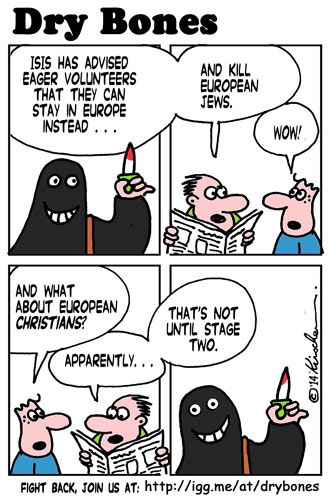
A headline in London exclaims that what happened in Paris "has galvanized France." Well, that's good, so far as it goes. Galvanized can be a good thing only if the galvanizee stays galvanized. The record is not encouraging.
September 11 galvanized the world, a date that, like December 7, would live in infamy. In the wake of September 11 a leading newspaper in Paris proclaimed that "we are all Americans now." President George W. Bush, standing in the ruins of the World Trade Center, with wisps of smoke and ash curling at his feet, promised to avenge the blood and bone of the 3,000 Americans who perished on a day with a harvest of dead to rival that at Antietam or Pearl Harbor.
We know how all that turned out, galvanized or not. Within a matter of weeks the naysayers were picking apart the resolve that united the nation, and the spirit of September 11 turned out to be not even a ghost of December 7. The infamy remained, the infamy of short memories, impatience and wilting resolve.
This is not your grandfather's country, where resolve thrived, multiplied and prospered, as we're reminded a hundred times a day. Resolve is like ice cream, delicious and satisfying in the moment, but it melts quickly. Some of the most heroic galvanized words fall from the tongue of the British and French prime ministers, and theirs are the countries most overrun with the waves of immigrants with no taste for the melting pot that once could transform an immigrant from Pakistan or Syria into an Englishman or a Frenchman, or at least a fairly reasonable facsimile thereof. No longer. Whole neighborhoods in London and Paris have become places where "outsiders," including police, no longer dare go. Cities are soon divided by tribe and caste.
America is led by a president who neither understands nor celebrates the America that elected him. He knows only that his election, and re-election, gave him an opportunity to get on with transforming America into a nation that your grandfather would not recognize. The president's remarkable snub of the solidarity march in Paris cannot surprise anyone who has been paying attention to the news. This president cannot bring himself to confront the threat to America and call it by its rightful name.
This indifference to reality is followed closely by the plotters of the evil of the Islamic State, or ISIS or ISIL or whatever they're calling evil this week. The thrill of marching in Paris will wear off, and then what? Will the West go back to the comfort of indolence and the luxury of indifference?
ISIS is betting that it will. We can be sure that the excitement of murder, massacre and mayhem like that in Paris will not wear off for the radicals, but will move to other places, including the United States. We will all be shocked and enraged, and someone will organize a march, or a rally, and we will be galvanized once more.
The massacres at Charlie Hebdo and the kosher supermarket in Paris and the reaction of the civilized world have accomplished one good thing, if it can be maintained and built on. The reaction has startled the world of Islam, and the worthy parts of that religion. Certain Muslims are overcoming their own fear of Islamic retribution and are speaking out, saying the things they should have said years ago, that evil men cannot be allowed to impose rule by barbarism.
They're stung by assertions in the West that there's something inherent in Islam that inspires many Muslims to see murder and mayhem as the way to plant their religion in the places where persuasion won't work. Many saddened Muslims say they are examining the empathy they felt in the past toward killers, that "even if they're wrong, they're still fellow Muslims."
But now, Hasan Askari Rizvi, an independent political analyst in Pakistan, tells The Associated Press, "I hear more people talking openly against extremism and militancy."
There's a lot that the West does not understand about a "faith" that does not require actual belief, but can be imposed by gun and scimitar. In the West, faith, like love, is felt in the heart. Something imposed by force, under threat of violence and death, is not something generally recognized as faith in the West.
A reformation of Islam, to weed out the false and the bad, will be a long-term project. The West can take heart, and wish the reformers well. But it cannot ignore the threat of the radicals, as certain leaders in the West are so eager to do. Otherwise, we're galvanized to remember a whole calendar of dates in infamy.
Comment by clicking here.
JWR contributor Wesley Pruden is editor emeritus of The Washington Times.



 Contact The Editor
Contact The Editor
 Articles By This Author
Articles By This Author